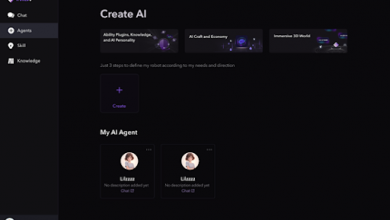Top 5 Accounting & Tax Tech Tools for Effortless Financial Reporting and Regulatory Adherence

In today’s fast-paced business landscape, keeping your financial house in order can feel like trying to juggle flaming torches while riding a unicycle. Between the complexities of tax regulations and the demands of accurate financial reporting, it’s no wonder many professionals find themselves feeling overwhelmed. But fear not! The rise of accounting and tax tech tools has arrived as a game-changer for businesses large and small. Whether you’re a seasoned accountant or an entrepreneur navigating the world of finance, these innovative solutions promise to simplify your life by streamlining processes and ensuring compliance with ease. In this blog post, we’ll unveil the top 5 accounting and tax tech tools that will take you from chaos to clarity, empowering you to focus on what truly matters—growing your business with confidence! Let’s dive in!
Introduction to Accounting & Tax Tech
In today’s fast-paced business landscape, the role of technology in accounting and tax management cannot be understated. With regulations becoming increasingly complex, staying compliant while managing financial reporting can feel like an uphill battle. Fortunately, innovative Accounting & Tax Tech tools are here to simplify the process. These solutions not only streamline workflows but also enhance accuracy and efficiency. If you’re looking to take your financial reporting and compliance efforts up a notch, you’re in the right place. Let’s explore how these cutting-edge tools can transform your approach to accounting and taxes for effortless financial governance!
Benefits of Using Tech Tools for Financial Reporting and Compliance
Tech tools revolutionize financial reporting and compliance for businesses of all sizes. They streamline data collection, making it easier to gather information from various sources without the hassle of manual input.
Automation reduces human error significantly. With algorithms handling calculations, companies can trust their numbers more than ever before.
Real-time insights are another major advantage. Businesses can monitor their financial health continuously rather than waiting for monthly or quarterly reports.
Collaboration also improves with tech tools in play. Teams across departments can access shared data effortlessly, ensuring everyone is on the same page regarding compliance requirements.
Moreover, these solutions often come equipped with regulatory updates automatically integrated into their systems. This means companies stay compliant without needing constant oversight or dedicated resources to track changes in laws and regulations.
Using accounting and tax technology not only enhances efficiency but also fosters a proactive approach to financial management.
Top 5 Accounting & Tax Tech Tools:
When it comes to streamlining financial tasks, several tools stand out in the accounting and tax tech landscape.
Xero offers a user-friendly interface that simplifies bookkeeping for businesses of all sizes. Its real-time collaboration features allow teams to work seamlessly together.
QuickBooks remains a favorite for its robust functionality. From invoicing to expense tracking, it covers everything an accountant needs while integrating with various third-party apps.
FreshBooks shines in the realm of service-based businesses. It not only handles billing but also provides intuitive time-tracking capabilities, making it perfect for freelancers.
Gusto takes payroll management up a notch. Beyond just processing paychecks, it manages employee benefits and compliance effortlessly.
TaxJar focuses on simplifying sales tax calculations and filings. For e-commerce platforms, this tool is invaluable as it automates tedious processes that often lead to errors if done manually.
1. Xero
Xero stands out as a top choice in the realm of accounting and tax tech. Designed for small to medium-sized businesses, it offers an intuitive interface that simplifies financial management.
One of its impressive features is real-time collaboration. Multiple users can access data simultaneously, making teamwork seamless and efficient. This flexibility allows everyone from accountants to business owners to stay on the same page.
Automated invoicing is another game-changer within Xero. Users can set up recurring invoices or reminders, ensuring timely payments without manual effort. Plus, its robust reporting capabilities provide insights into cash flow and expenses at a glance.
Xero integrates effortlessly with numerous third-party applications, enhancing functionality further. Whether you need payroll solutions or inventory tracking, there’s likely an integration available that fits your needs perfectly.
This adaptability makes Xero not just a tool but a powerful ally in achieving accurate financial reporting and compliance.
2. QuickBooks
QuickBooks stands out as a leading choice for small to medium-sized businesses. Its user-friendly interface simplifies the complexities of accounting, making it accessible even for those without extensive financial training.
Users can manage invoices, payroll, and expenses seamlessly in one platform. Automated features reduce manual work and minimize errors, allowing business owners to focus on growth rather than paperwork.
The integration with various apps enhances its functionality further. Whether tracking inventory or managing customer relationships, QuickBooks offers tools that adapt to diverse business needs.
Moreover, real-time reporting provides insights into financial health at any moment. This ensures that compliance requirements are met effectively without the last-minute rush often associated with tax season.
For teams working remotely or in multiple locations, QuickBooks Online offers cloud accessibility—making collaboration easy and efficient from anywhere in the world.
3. FreshBooks
FreshBooks stands out as a user-friendly accounting tool designed specifically for small businesses and freelancers. Its intuitive interface simplifies the complexities of financial management, making it accessible even for those without an accounting background.
With features like invoicing, expense tracking, and time tracking, FreshBooks streamlines everyday tasks. Users can create professional invoices in minutes and set up automated reminders to ensure timely payments.
The software’s robust reporting capabilities provide insights into cash flow and profitability. This empowers users to make informed decisions based on real-time data.
Additionally, FreshBooks integrates seamlessly with various other applications such as PayPal and Stripe. These integrations further enhance its functionality by allowing users to manage their finances from one central platform.
For anyone looking to automate financial reporting while maintaining compliance with tax regulations, FreshBooks is a solid choice that combines efficiency with simplicity.
4. Gusto
Gusto stands out as a comprehensive platform designed to simplify payroll, benefits administration, and HR tasks. Small businesses often face challenges in managing these areas effectively. Gusto’s user-friendly interface makes it easier for teams to navigate their financial responsibilities.
One of its standout features is automated payroll processing. This function ensures employees are paid accurately and on time without the hassle of manual calculations. Additionally, Gusto seamlessly integrates with various accounting software, enhancing overall efficiency.
Businesses can also manage employee benefits effortlessly through Gusto. From health insurance options to retirement plans, everything is consolidated in one place. It even assists with tax filings by automatically calculating deductions.
This tool not only saves time but minimizes errors that can lead to compliance issues. For companies looking to streamline operations while ensuring regulatory adherence, Gusto is an invaluable resource worth considering.
5. TaxJar
TaxJar is a powerful tool designed specifically for simplifying sales tax compliance. It provides businesses with the ability to automate their sales tax calculations, making it incredibly efficient for e-commerce shops.
The platform integrates seamlessly with major online marketplaces and shopping carts. This means you can manage your tax obligations without sifting through endless spreadsheets or complex calculations.
One of TaxJar’s standout features is its real-time reporting capabilities. You can view detailed reports on your sales tax collected across various jurisdictions at any time.
Additionally, TaxJar takes the stress out of filing by allowing users to generate accurate returns based on their collected data. For busy entrepreneurs, this automation reduces errors and saves valuable time that can be redirected toward growing the business.
With its user-friendly interface and robust support resources, TaxJar stands out as an essential partner in navigating today’s complicated tax landscape.
How These Tools Can Help in Automating Financial Reporting and Ensuring Regulatory Adherence
Automation is a game-changer in the realm of financial reporting and compliance. Accounting & tax tech tools streamline processes that once took hours or even days to complete.
With features like automatic data entry, businesses can eliminate human error and focus on critical analysis rather than tedious tasks. These tools capture transactions in real-time, ensuring accurate and up-to-date records.
Regulatory adherence becomes less daunting as these platforms often include built-in compliance checks. They alert users about upcoming deadlines, helping avoid costly penalties.
Moreover, custom reports can be generated effortlessly, providing insights into financial health while meeting regulatory requirements. This not only saves time but enhances decision-making capabilities for business leaders.
By utilizing advanced analytics within these tools, organizations gain deeper insights into trends and patterns that inform strategic planning without the hassle of manual calculations.
Potential Drawbacks/Challenges of Implementing these Tools
While tech tools for accounting and tax can greatly enhance efficiency, they are not without their challenges. One significant concern is the learning curve associated with new software. Employees may require training to fully utilize these systems, which can take time and resources.
Another issue is integration with existing processes. Businesses often face compatibility problems when trying to sync these tools with current workflows or legacy systems. This can lead to data discrepancies and reduced overall productivity.
Cost is another factor that businesses should consider. Although many platforms offer subscription models, expenses can add up—especially for small companies operating on tight budgets.
Lastly, security risks cannot be overlooked. Storing sensitive financial information online poses potential threats from cyberattacks or data breaches, making it essential for companies to prioritize robust security measures alongside implementation.
Tips for Choosing the Right Tool for Your Business
Choosing the right accounting and tax tech tool can seem daunting. Start by assessing your specific business needs. Identify features that are crucial, such as invoicing, payroll management, or expense tracking.
Budget is another vital factor. Determine how much you’re willing to invest in these tools without compromising on essential functionalities.
User experience plays a significant role too. Opt for software with an intuitive interface that requires minimal training for your team.
Don’t underestimate customer support. A responsive support system can save you from headaches down the line when issues arise.
Consider scalability as well. As your business grows, so should your chosen tool’s capabilities to accommodate increased complexity or volume of transactions.
Lastly, reading reviews and seeking recommendations from other businesses can provide valuable insights into real-world experiences with these tools.
Embracing Technology for Effortless Financial Reporting and Regulatory Adherence
Embracing technology in the realm of accounting and tax can significantly streamline financial reporting and ensure compliance with regulations. The tools discussed, from Xero to TaxJar, provide businesses with powerful features that help automate tedious tasks. This not only saves time but also reduces errors that often accompany manual processes.
As organizations continue to evolve, so do their needs for efficient financial management solutions. By choosing the right tech tools, companies can gain valuable insights into their finances while staying compliant with ever-changing regulatory requirements.
Investing in these advanced systems is a step forward towards achieving better transparency and accuracy in financial operations. Each tool has its unique strengths, making it essential for businesses to assess what aligns best with their specific goals.
The journey toward effortless financial reporting doesn’t have to be daunting when you leverage the right technology. With careful consideration and implementation of these accounting and tax tech tools, any business can navigate the complexities of finance more effectively.
Conclusion
In today’s fast-paced business world, staying on top of financial reporting and regulatory adherence is crucial for any organization. Fortunately, there are a plethora of accounting and tax tech tools available to make these tasks effortless. From automated bookkeeping software to AI-powered compliance platforms, businesses have access to advanced technology that can streamline their financial processes and ensure compliance with regulations. By leveraging these top 5 tools and incorporating them into your business operations, you can stay ahead of the game while saving time, money, and resources. Embrace these technological advancements in the realm of finance and watch your business thrive!

Source: Top 5 Accounting & Tax Tech Tools for Effortless Financial Reporting and Regulatory Adherence




